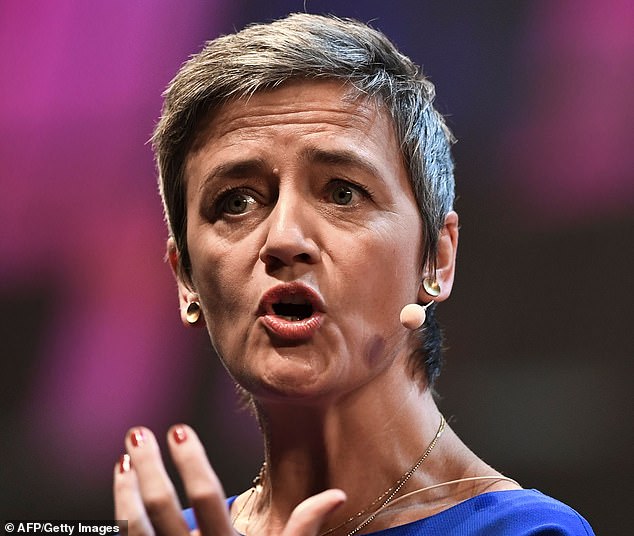Table of Contents
Brussels yesterday scored a double victory over US tech giants by winning important legal battles against Apple and Google.
In a boost for EU competition chief Margrethe Vestager, the Court of Justice of the European Union (CJEU) has ruled against Silicon Valley titans in two long-running legal disputes.
Apple was first ordered to pay back £11 billion in unpaid taxes in Ireland.
And in a separate decision, judges ruled that Google must pay a fine of 2 billion pounds for anti-competitive behaviour.
Victory: EU competition chief Margrethe Vestager (pictured) hailed “a huge victory for European citizens”
Both Apple and Google said they were “disappointed” by the decisions, which cannot be appealed.
Vestager, 56, whose term ends in November after making a name for herself by going after big tech on tax and competition issues, hailed “a great victory for European citizens.”
Apple was first ordered to pay an £11bn fine in 2016 after a two-year investigation found Ireland had given the iPhone maker an illegal tax deal, amounting to a tax rate of less than 1 per cent.
Tim Cook, Apple’s then chief executive, called the decision “complete political rubbish” and the tech company, which has had its European headquarters in Cork since 1980, appealed the ruling.
But EU judges said yesterday that the two Apple units incorporated in Ireland enjoyed favourable tax treatment compared with resident companies that pay taxes in the country.
The judges said their ruling upheld a 2016 decision that “Ireland provided Apple with unlawful aid which Ireland is required to recover.”
An Irish government spokesman said: ‘The Irish position has always been that Ireland does not provide preferential tax treatment to any company or any taxpayer.
“Ireland will of course respect the court’s findings regarding the tax owed in this case.”
In the Google case, the court ruled that it must pay the £2 billion fine imposed on it following its anti-competitive behaviour with its comparison shopping service.
The key argument was that Google made its own shopping recommendations appear more prominently than those of its rivals in search results.
Like its Silicon Valley counterpart, Google appealed the fine, which was originally imposed by the Commission in 2017.
But in another setback for the US group, the CJEU judges said: “In light of the characteristics of the market and the specific circumstances of the case, Google’s conduct was discriminatory and did not fall within the scope of competition on the merits.”
Vestager, posting on X, formerly known as Twitter, described it as “a major victory for European citizens and tax justice”.

Anger: Apple CEO Tim Cook called the decision “complete political rubbish”
He added: “This is a victory for the Commission. It is also a victory for a level playing field in the internal market and for tax justice.”
Google has racked up £7bn in EU antitrust fines over the past decade. It is also awaiting two rulings relating to its Android mobile system and advertising service.
Meanwhile, Apple was recently fined £1.5 billion for abusing its position in the music streaming industry.
Experts said the resolutions would encourage the EU to continue cracking down on big tech companies.
Alex Haffner, competition partner at law firm Fladgate, said: “EU authorities and courts are prepared to flex their collective muscles to bring Big Tech to heel when necessary.”
Dan Neidle, founder of the Tax Policy Associates think tank, said the ECJ’s decision on Apple would have “significant implications” that will shape how EU companies view tax regimes.
“This is a major victory for the Commission: its strategy of using competition law and state aid to override national tax rules has been successful,” he said.
The EU has pushed through key legislation to tackle big tech companies.
The Digital Markets Act aims to crack down on unfair competition, while the Digital Services Act seeks to protect users and make online environments safer.
Both specifically target six “gatekeepers”: Alphabet, which owns Google, Amazon, Apple, Meta, Facebook’s parent company, Microsoft, and ByteDance, which owns TikTok.
And tech companies that fail to comply with the new rules could face fines of up to 10 percent of the company’s global sales.
There are also clouds on the horizon for the country’s technology companies.
Last month, the US Department of Justice issued a landmark ruling finding that Alphabet monopolized the online search market.
In the worst case, that could result in the breakdown of the business.
Alternatively, it may be forced to share more data with its competitors to avoid gaining an unfair advantage.
In another setback, another lawsuit seeking to break up the company was filed this week.
The lawsuit alleges that Google is monopolizing the advertising market through its software that connects online publishers with advertisers.
“One monopoly is bad enough, but what we have here is a trilogy of monopolies,” Justice Department attorney Julia Tarver Wood said during her opening statement Monday.
DIY INVESTMENT PLATFORMS

AJ Bell

AJ Bell
Easy investment and ready-to-use portfolios

Hargreaves Lansdown

Hargreaves Lansdown
Free investment ideas and fund trading

interactive investor

interactive investor
Flat rate investing from £4.99 per month

Saxo

Saxo
Get £200 back in trading commissions

Trade 212

Trade 212
Free treatment and no commissions per account
Affiliate links: If you purchase a product This is Money may earn a commission. These offers are chosen by our editorial team as we believe they are worth highlighting. This does not affect our editorial independence.
Some links in this article may be affiliate links. If you click on them we may earn a small commission. This helps us fund This Is Money and keep it free to use. We do not write articles to promote products. We do not allow any commercial relationships to affect our editorial independence.

